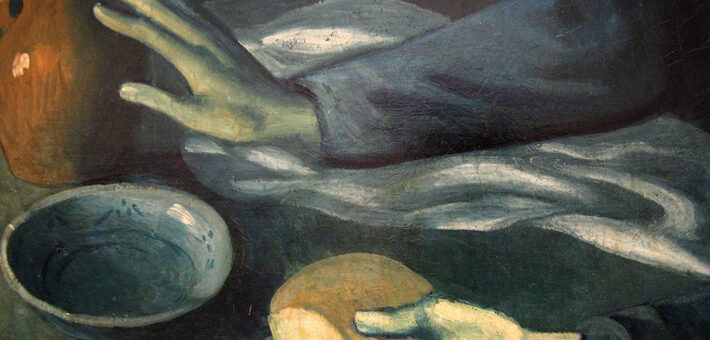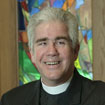Commentary on John 6:51-58
The temptation on this Sunday, when the gospel reading is so obviously, if not originally and explicitly about the Eucharist, is to endeavor to explain Holy Communion.
On the one hand, we may hear sermons on worthy reception, discerning Christ’s body, knowing ourselves to be sinners, and believing in the real presence. On the other hand, we may hear sermons that explain this is Jesus’ meal and table and not the church’s meal and table. I struggle with sermons that draw such a stark distinction between Christ and his Church.
Whichever the approach, we participate in the Church’s centuries old practice that we need to know some things before we are ready to receive the Lord’s Supper. A few years ago, I was interviewed about Holy Communion for a Lutheran denominational video series. Among other things, I was asked to explain “consubstantiation,” which seemed kind of silly since, as adults who receive Holy Communion, this audience should have already known what that means.
I am struck that Jesus does not give the crowd in the wilderness (what for us is) a four-Sunday discourse on the Bread of Life until after they have eaten their fill of the loaves and fishes. Jesus did not make the five thousand sit down on the grass and give them a lecture so that they understood before he “took the loaves, and when he had given thanks, he distributed them to those who were seated; so also the fish, as much as they wanted” (John 6:11). It almost seems that, if Jesus hadn’t fed the large crowd, he wouldn’t have much to say.
And in these verses where Jesus picks up on the feeding by speaking of giving his flesh to eat, his concern is less with getting his hearers to understand as getting them to eat. Jesus tells his hearers of their absolute need to eat the flesh and drink the blood of the Son of Humanity. “Very truly, I tell you,” Jesus says, “unless you eat the flesh of the Son of Man and drink his blood, you have no life in you. Those who eat my flesh and drink my blood have eternal life, and I will raise them up on the last day” (John 6:53-54). The words “flesh” and “blood” point to the cross, where Jesus’ flesh will be broken and his blood will be spilled, Jesus associates the separation of his flesh and blood in his violent death on the cross as the moment when Jesus will totally give his whole self for the life of the world.
The shift in the Greek text from the more polite verb “to eat” to a verb that suggests the physical crunching with the teeth accentuates that Jesus intends a real experience of eating. At the very least, hints of the Eucharist find their way into Jesus’ words. For us who will come to the table, the connection is unavoidable. As we eat the bread and drink the cup, we participate in the promise that Jesus fulfilled on the cross. It seems we also participate in the violence by which that promise was fulfilled — crunching with our teeth.
Jesus promises rather than instructs or explains. Jesus promises that whoever eats the flesh and drinks the blood of Jesus, the Son of Humanity, has eternal life now and will be raised up on the last day. Jesus promises to provide food for the life of the world, his flesh and blood. Jesus promises to nourish the world with the gift of himself. For the “flesh” and “blood” of Jesus, his incarnate life and very real death on the cross, is life-giving food for us and for the world. In, with, and under the bread and wine of Holy Communion, which is nothing other than Christ’s body and blood, Jesus nourishes faith, forgives sin, and empowers us to be witnesses to the Gospel. What would it mean for preachers to proclaim Jesus’ promises rather than explain the sacrament?
All throughout John 6, Jesus has tried to help us embrace that God’s wisdom — to steal a word from Proverbs — is not so much knowledge to be explained and understood as it is relationship to be trusted and embraced. Jesus no longer speaks of “belief in,” as we find in chapter 3, but of “the one who eats me” (verse 57). For eternal life does not come through understanding correctly or believing the right things. Eternal life is being in close communion with Jesus. Eternal life is to remain in Jesus and to have Jesus remain in us. We take Christ’s body and blood into our mouths, into our stomachs, into our bodies, so that Christ remains in us and we remain in Christ. As we eat and drink, Christ moves us closer to himself. Christ moves us closer to the very life of God. Christ moves us closer to himself, so close that we are as intimate with Jesus as the Father is with the Son.
If in bygone days we leaned too far in the direction of understanding before being invited to eat, perhaps today we lean too far toward eating without proclaiming Jesus’ promise and inviting into relationship with him (baptism). There is certainly more going on at Jesus’ table and in, with, and under the bread and wine that is Jesus’ body and blood than loaves and fishes, manna, and a fellowship meal at which all are welcome. “Those who eat my flesh and drink my blood have eternal life, and I will raise them up on the last day.” Jesus promises. “Those who eat my flesh and drink my blood abide in me, and I in them. Just as the living Father sent me, and I live because of the Father, so whoever eats me will live because of me” (John 6:54-57). Indeed, as I hear many Sundays, it is Jesus’ table. What I hear less frequently is what Jesus promises to do at his. Perhaps proclaiming Jesus’ promises will bring our hearers from loaves and fishes to the body and blood of Christ.


August 16, 2015